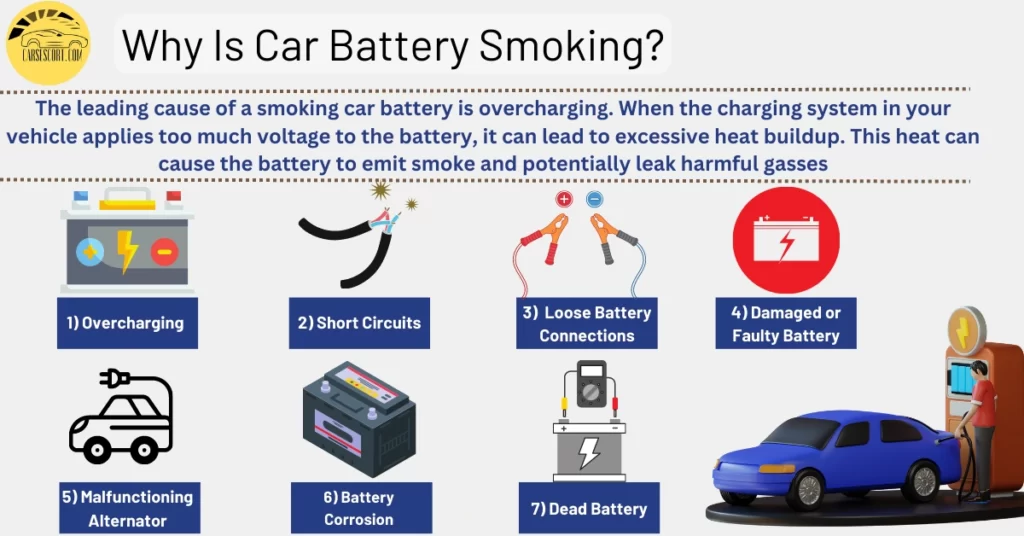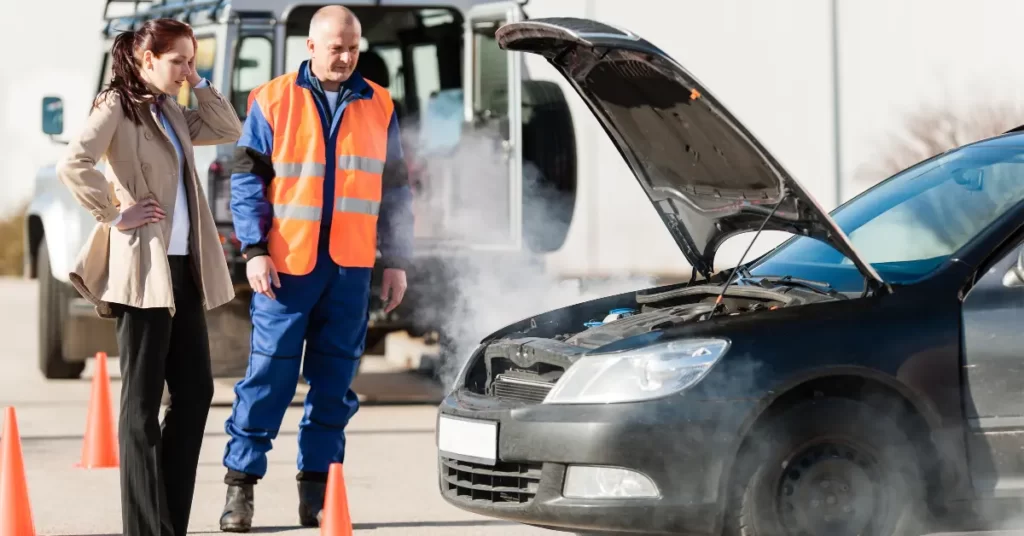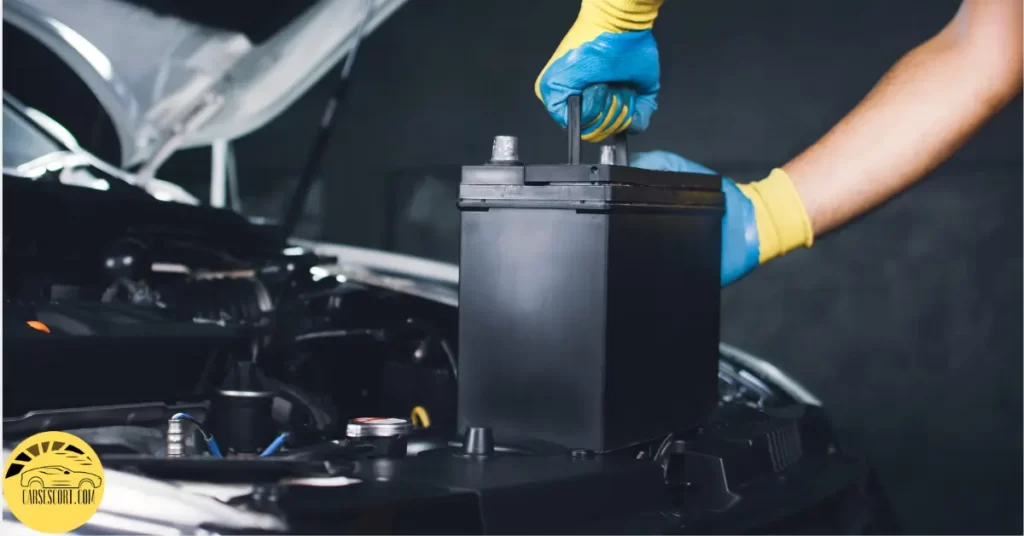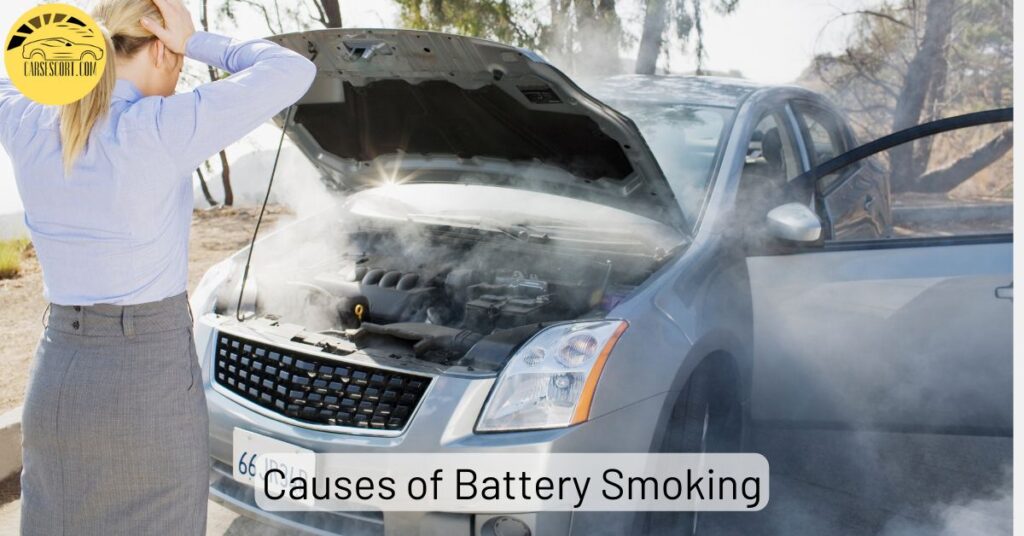When you’re driving and notice smoke coming from your car battery, it can be a cause for concern. A smoky and steaming car battery is not normal and can indicate potential problems that need immediate attention.
The leading cause of a smoking car battery is overcharging. When the charging system in your vehicle applies too much voltage to the battery, it can lead to excessive heat buildup. This heat can cause the battery to emit smoke and potentially leak harmful gasses.
However, many other reasons can also cause steaming in car batteries. Understanding all the possible causes and fixes is essential for every driver for a safe driving experience.
Driving with a smoky battery can be hazardous for you and your vehicle.
Keep reading!!
Can I Drive With A Smoking Battery?
No, driving with a smoking battery can be hazardous for your safety and vehicle maintenance. If you notice smoke from your vehicle’s battery, it could indicate a serious problem. Smoke can be a sign of a potentially dangerous situation, so it’s essential to handle it cautiously.
In such a situation, it is crucial to prioritize safety and take immediate action.
6 Causes of Battery Smoking

1) Overcharging and Excessive Heat
When the charging system in your vehicle applies too much voltage to the battery, it can lead to excessive heat buildup. Overcharging can occur if the voltage regulator malfunctions or the charging system is faulty.
When a battery is overcharged, it can generate excessive heat, which may lead to smoking and potentially leak harmful gasses.
2) Short Circuits and Electrical Malfunctions
Electrical system malfunctioning and short circuits are the leading cause of battery issues.
A short circuit happens when there is an unintended connection between the positive and negative terminals of the battery often due to damaged or frayed wiring.
Short circuits can cause a current surge, generating heat and potentially resulting in smoking. A short circuit may be caused by damaged or frayed wiring, loose connections, or faulty electrical components.
3) Corroded or Loose Battery Connections
Corroded or loose battery connections can also contribute to a smoking car battery. When there is corrosion or poor contact between the battery terminals and cables, it can impede the proper flow of electricity resulting in increased resistance, generating heat and smoke.
4) Damaged or Faulty Battery
If the battery case is damaged or cracked, it can expose the internal components to the air, which may result in a chemical reaction, steaming and smoking.
An internally damaged battery can undergo a chemical reaction that generates excessive heat and smoke. Similarly, a faulty battery with internal short circuits may exhibit smoking behavior.
Physical damage can occur due to accidents, improper handling, or battery aging.
5) Malfunctioning Alternator
The alternator is responsible for charging the battery while the engine is running. If the alternator malfunctions and delivers an excessive charge to the battery, it can lead to overcharging and subsequent smoking.
A malfunctioning alternator may result from a faulty voltage regulator or other internal components.
6) Battery Corrosion
Corrosion on the battery terminals and cables can impede the flow of electricity, causing resistance and heat buildup. This resistance can result in battery smoking.
Corrosion often occurs due to a buildup of acidic residue around the battery terminals, which can be caused by age, exposure to moisture, or a leak from the battery itself.
7) Dead Battery
A dead or severely discharged battery can also produce smoke when attempting to jump-start the vehicle. When jump-starting, a large amount of current is transferred to the dead battery.
If the battery has been discharged for an extended period, it may develop internal damage, causing it to heat up and smoke during the jump-starting process.
Is A Smoking Car Battery Dangerous?
Yes, a smoking car battery can be dangerous. Smoking indicates that there may be a problem with the battery or its surrounding components, which could lead to further issues or even accidents.
Smoking from a car battery can indicate an electrical short circuit or a faulty connection.
If sparks or an unusual smell accompanies the smoke, it could ignite flammable materials nearby and lead to a fire.
Batteries contain highly corrosive sulfuric acid, which can cause severe burns or damage to the skin and eyes.
Inhaling these fumes can be harmful to health.
A malfunctioning battery can affect the overall electrical system of the vehicle, leading to issues such as a loss of power, difficulty starting the engine, or the failure of essential systems like lights or brakes.
What To Do With A Smoking Battery?
If you face a situation when your car battery suddenly starts steaming or smoking, there are some essential safety precautions that your need to follow immediately.
- Pull to a safe location and turn off the engine.
- Avoid driving with a smoking battery, as it can harm you and others.
- Keep a safe distance from the vehicle and avoid touching the smoking battery.
- If the smoke is significant or there’s a strong smell of burning, it’s advisable to exit the vehicle promptly.
- Contact emergency services or a professional roadside assistance service to report the situation and ask for guidance.
- It’s best to avoid touching or handling it. Battery acid and its fumes can be harmful, and there’s a risk of burns or electrical shock.

Read More About Your Car Care:
Solutions For A Smoking Car Battery
Addressing a smoking car battery requires professional intervention. Here are some potential solutions that a qualified mechanic may suggest:
- Thoroughly inspect the battery, wiring, and connections for any damage or signs of malfunction.
- Repair or replace damaged cables, wiring, or battery components as necessary.
- Test the charging system to ensure it functions correctly and not overcharges the battery.
- Replace the battery if it is faulty or damaged beyond repair.
Preventive Measures
To minimize the risk of a smoking car battery in the future, consider implementing the following preventive measures:
- Regularly inspect and clean the battery terminals and connections to prevent corrosion.
- Check the battery’s water level (if applicable) and maintain it within the recommended range.
- Avoid overloading your vehicle’s electrical systems, such as using excessive aftermarket accessories.
- Schedule regular maintenance checks to ensure the overall health of your vehicle’s electrical system.
Safety Precautions
Safety should always be a top priority when dealing vehicle-related issue. Follow these safety precautions to protect yourself and others:
- Never touch a smoking car battery or its surrounding components, as they can be hot and potentially harmful.
- Always carry a fire extinguisher in your vehicle for emergencies.
- Familiarize yourself with the location of the battery disconnect switch or fuse, which can be used to cut off power to the battery in case of an emergency.
- If you suspect a smoking car battery, avoid inhaling the smoke and move away from the vehicle to a safe location.
- Inform the relevant authorities, such as the fire department, if the situation escalates or threatens others.
Importance of Professional Assistance
When dealing with a smoking car battery, seeking professional assistance is vital. A qualified mechanic or automotive technician possesses the expertise and knowledge to diagnose the problem accurately and implement appropriate solutions.
Fixing the issue, yourself without the necessary expertise can lead to further complications or potential hazards.

How To Prevent A Battery From Overheating And Smoking?
1) Adequate Ventilation
Ensure that the battery compartment or area has proper ventilation. Proper ventilation allows heat to dissipate efficiently and reduces the risk of overheating.
Ensure no obstructions are blocking the airflow around the battery.
2) Regular Maintenance
Keep the battery clean and free from dirt, dust, and corrosion. Clean the battery terminals periodically using a battery cleaning brush and a solution of baking soda and water to prevent excessive resistance that can lead to overheating.
3) Inspect Cables
Regularly check the cables for any signs of damage, such as cracks, fraying, or loose connections. Damaged cables can cause resistance and heat buildup. If you notice any issues with the cables, replace the cables promptly.
4) Avoid Overcharging
Overcharging can lead to excessive heat generation and battery damage. Make sure your vehicle’s charging system is functioning correctly.
If you suspect a problem, have it checked by a professional mechanic.
5) Check the Alternator
The alternator charges the battery while the vehicle runs. If the alternator is faulty or overcharged, it can cause the battery to overheat. If you experience frequent battery problems, have the alternator tested and repaired if necessary.
6) Be Mindful of Battery Placement
Avoid placing additional heat sources near the battery, such as exhaust pipes or hot engine components. The heat from these sources can contribute to battery overheating.
Ensure the battery is securely mounted to prevent excessive vibration, which can also lead to overheating.
7) Avoid Jump-Starting in Extreme Conditions
Jump-starting a vehicle in extreme heat can strain the battery, potentially causing it to overheat. Park in a shaded area or allow the battery to cool down before jump-starting.
8) Monitor Battery Fluid Levels
Some vehicle batteries require periodic checks of the electrolyte levels. If your battery has removable caps, ensure the fluid levels are within the recommended range.
Low fluid levels can cause the battery to overheat due to increased resistance.
9) Replace Old or Faulty Batteries
Batteries degrade and become less efficient over time. If your battery is old, weak, or showing signs of failure, it’s advisable to replace it to prevent overheating and potential hazards.
10) Follow Manufacturer Guidelines
Always refer to the vehicle’s owner’s manual for specific maintenance instructions and recommendations from the manufacturer. They may provide additional guidelines tailored to your vehicle model.
How To Fix Battery Smoking?
If your car battery is steaming, smoking or not working properly, addressing it promptly and taking appropriate safety precautions is important.
Wear protective gloves and safety glasses before attempting any work on the battery. Smoking batteries can be dangerous, so exercise caution.
Disconnect the Battery
Start by turning off the engine and removing the keys from the ignition. Locate the battery in your car’s engine bay. Identify the negative (black) and positive (red) terminals.
Use a wrench or socket set to loosen and remove the terminal connections in the following order: negative (-) first, then positive (+). This will disconnect the battery from the car’s electrical system.
Isolate the Battery
Once the terminals are disconnected, carefully lift the battery from the engine bay and place it in a well-ventilated area away from flammable materials.
Ensure that the battery is on a stable surface.
Identify the Cause
The smoking battery could be caused by various factors such as a short circuit, internal damage, overcharging, or an aging battery.
Inspect the battery for visible signs of damage, leaks, or loose connections. If you notice any obvious issues, such as a cracked case or leaking fluid, it’s likely time for a replacement.
Allow the Battery to Cool
If it is still smoking, let it cool down naturally. Do not attempt to cool it with water or any other liquid.
Call for Professional Help
Faulty batteries can be hazardous, and attempting to repair or revive a damaged battery can be dangerous.
Contacting a professional mechanic or battery specialist to evaluate the situation and provide expert assistance is highly recommended.
FAQ
Why is the car battery smoking and smelling like rotten eggs?
If a car battery is smoking and smells like rotten eggs, it could indicate a problem with the battery. The most common reason is battery overcharging, which can lead to the electrolyte inside the battery boiling and releasing sulfuric acid fumes. The rotten egg smell is caused by the sulfur compounds present in the battery.
Why is the battery smoking when trying to start?
If a battery is smoking when you attempt to start the car, it typically suggests that it is experiencing high internal resistance. This can occur due to a dead or faulty cell within the battery or a damaged internal plate.
When you try to start the car, a significant amount of current is drawn from the battery, causing it to heat up and potentially produce smoke.
It is advisable to have the battery inspected and replaced if necessary to avoid further issues.
What causes a battery to steam?
If a battery is steaming, it is usually a sign of excessive heat generation and potential overcharging. Overcharging can cause the electrolyte within the battery to reach a boiling point, emitting steam.
Why is a new car battery smoking?
Smoking from the new installed car battery usually indicates a problem with the battery, such as overcharging or a manufacturing defect. Overcharging can occur if the vehicle’s charging system is not functioning properly or if the battery is incompatible with the car’s electrical system.
Why is the car battery smoking when jumping?
If a car battery smokes when you are attempting to jump-start it, it could be due to the high current passing through the battery during the jump-starting process. This can happen with a short circuit or a damaged cell within the battery, causing it to overheat and produce smoke.
Why is the car battery smoking and leaking?
Smoking indicates a potential electrical problem, such as overcharging or a short circuit, while leaking damages the battery casing or internal components. Overcharging can lead to the electrolyte boiling, causing the battery to smoke, while leaks can occur due to physical damage or corrosion.
Why is the car battery smoking while charging?
If a car battery is smoking while being charged, it suggests a problem with the charging process. Smoking during charging can occur due to overcharging, where the charging voltage exceeds the recommended limits for the battery.
My Final Thoughts
A smoking car battery should never be ignored, as it indicates an underlying problem that requires prompt attention. Whether it’s due to overcharging, electrical malfunctions, corroded connections, or a faulty battery, taking immediate action is crucial for your safety and the proper functioning of your vehicle.
Remember to prioritize your well-being by following safety precautions, seeking professional assistance, and implementing preventive measures to minimize the risk of a smoking car battery in the future.
Stay vigilant, stay safe, and ensure the optimal performance of your vehicle’s electrical system.
Affiliate Disclosure: Cars Escort is a participant in the Amazon Services LLC Associates Program. As an Amazon Associate, we earn from qualifying purchases made through affiliate links on our site. Read Our Disclaimer .

